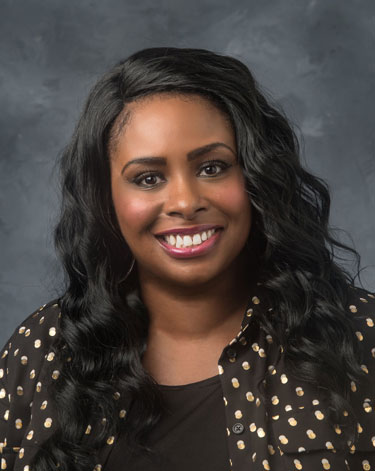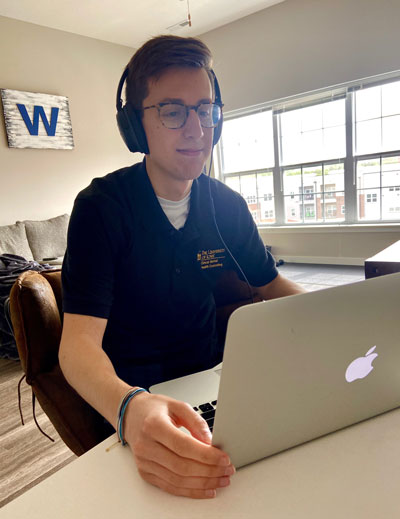Students in the Clinical Mental Health Counseling and Rehabilitation Counseling master's programs would normally be spending time on site during the spring semester—either for internship placements or in preparation for their practicums. With social distancing measures in effect and many sites shut down, COVID-19 prevented students from offering in-person sessions. So, counseling students moved online.
Erin Barnes, PhD, a clinical assistant professor in the Department of Rehabilitation and Counselor Education, has spearheaded efforts to continue offering experiential learning for her students during the pandemic, while maintaining the services they provide to the community.

One such project she has led is the Coronavirus Anxiety Chat Line for older individuals, offered to members of the Iowa City/Johnson County Senior Center (The Center)—a community resource for adults over 50 years of age. This telecounseling service addresses an emerging need resulting from the coronavirus crisis and allows students to actively support this population.
“As graduate programs, we’re in a unique position to support agencies because we have the manpower,” says Barnes. “I’ve thought about how we can leverage graduate education to benefit our students while enhancing their commitment to the community. This focus on meeting community needs is what led me to start working with The Center last semester.”
The Center has been temporarily closed since March 16 and staff immediately began offering alternative programming to its more than 1,700 members. The chat line has been a helpful aspect of this programming and is meeting many crisis-related needs of vulnerable people in the community.
“Our vision at The Center is to end social isolation, so the chat line has helped address related aspects of this,” says LaTasha DeLoach, Coordinator of The Center. “It’s helped address the issues that come up in situations like this, such as loneliness, anxiety, and depression. It’s great that seniors are willing to sign up for these calls and talk, especially because older adults are more susceptible to the coronavirus.”
While creating the chat line has helped address emerging issues, faculty and students working on the project have had to get creative in addressing other obstacles related to telecounseling itself.
“Tech issues and internet access are the biggest barriers to utilizing video conferencing for connecting with participants,” says Barnes. “Some seniors face issues due to their different tech abilities or they don’t have access to the internet at all. Some things that seem easy aren’t always that simple, so we’ve had to develop workarounds for situations like that.”

Barnes began looking for creative solutions to ensure these barriers would not prevent seniors from using the chat line. She advised students to create online tutorials for video and audio conferencing to help participants feel more comfortable with the technology. For those who did not have any access to the internet, they offered counseling over the phone. They have since been able to ‘talk’ with hundreds of interested members.
“Even with everything going on, it’s important to make sure we’re providing services for the community we live in and ensuring they have the access they need,” says Mark Biangmano, a master’s student specializing in clinical mental health counseling. “We’re taught in our program to be creative with counseling, so no matter how it happens, we get services to those who need them.”
HELPING STUDENTS, HELPING THE COMMUNITY
The coronavirus anxiety chat line is also beneficial for participating students—it meets their applied practice hours requirement. However, Barnes sees this experiential learning as a greater opportunity for students to learn more about an underserved population.
“I think that this will help students become more compassionate and thoughtful about populations they haven’t had much exposure to,” says Barnes. “Many times when our students do placements, they’re working with middle-aged adults or children. Very rarely do they get the opportunity to work with older adults. Not only will this provide students with clinical experience, it will help them become more thoughtful and committed to supporting older adults within the community.”
Students have also volunteered to take on other projects in partnership with The Center beyond the chat line. As part of The Center’s outreach activities during the closure of their building, counseling students have assisted staff in calling members throughout the pandemic. This has included surveying members on their needs and conducting general check-ins.
“We’ve gotten some feedback from seniors on how helpful and kind the students have been,” says DeLoach. “We couldn’t have gotten through 1,700 phone calls if it wasn’t for the students helping out. Having students help in that way is a huge service to the community and the folks we serve at The Center.”
TRENDS FOR THE PRACTICE
For counseling students, real world experience practicing telehealth ultimately benefits their future careers.

“I think there’s a big future in telehealth, especially as people have more mobility concerns and it becomes more palatable to have services provided in your home,” says Olivia Steinman, a master’s student specializing in rehabilitation counseling. “Even after this crisis is over, I see telehealth being much more utilized. It can provide services to people with mobility issues as well as to clients in rural counties who would otherwise have to drive hours for counseling and healthcare.”
Delivering counseling over the internet or by phone has the potential to make services more accessible for a range of clients and could potentially help reduce some of the stigma associated with seeking out mental health resources.
“I hope one of the results of this project is that people become more comfortable with counseling,” says Steinman. “We have a role in providing education about what counseling is and how it can be delivered. I hope we can put a positive and empowering lens on it so people recognize it can be whatever you are looking for. It’s a safe place to process your feelings and experiences and to figure out how you move forward in a healthy way.”
This focus has become even more important as the pandemic continues and the effects of social isolation become more widely understood. Counseling students at the University of Iowa have expressed how meaningful it is to continue providing this valuable support.
“If I’m not helping people through counseling, it’s a weird time,” says Biangmano. “It really helps to keep doing so during this crisis. We all love to provide these services, and to provide them for free makes it even more impactful.”